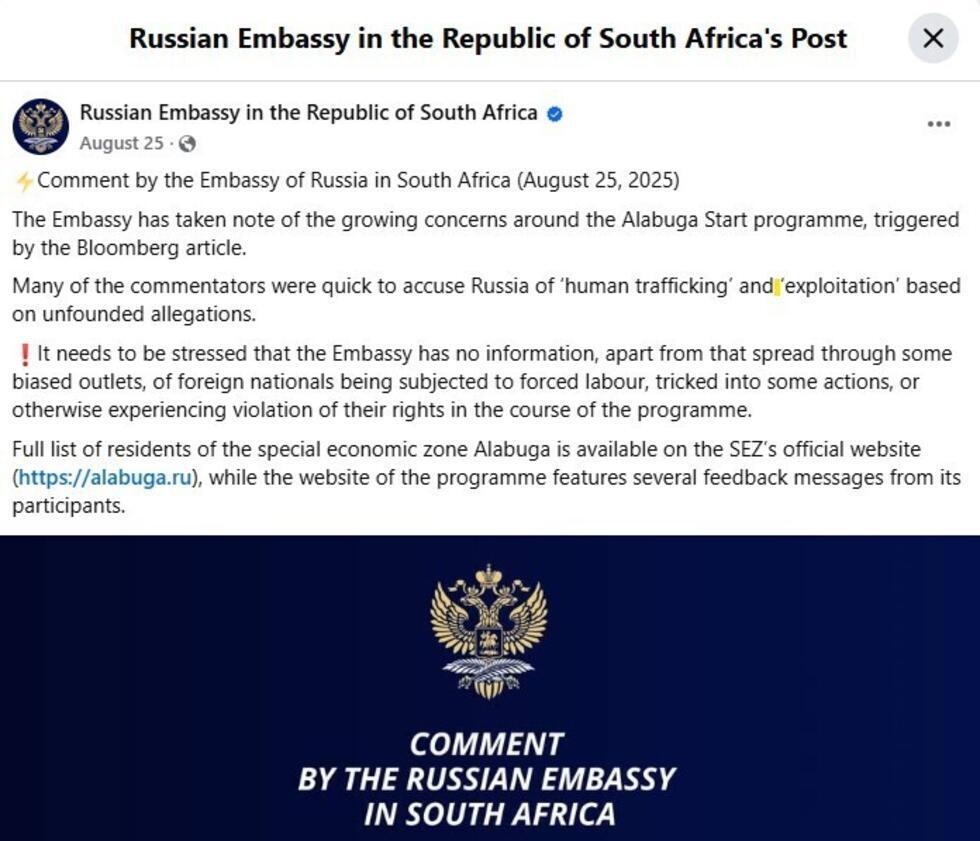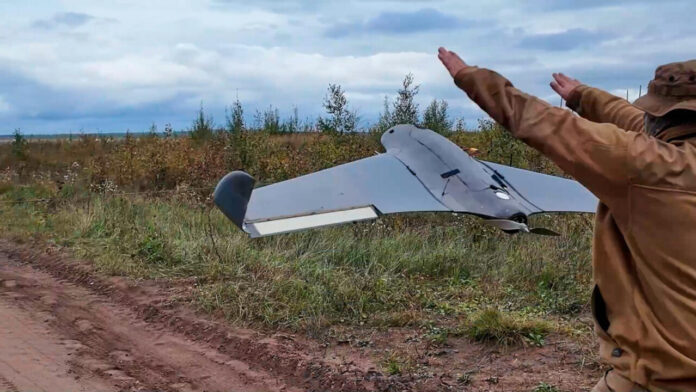The South African government has opened an investigation and issued a warning to its citizens after Russia was accused of making false promises to recruit young women from across Africa to work in drone-assembling factories. A number of South African influencers who were employed by Russia’s Alabuga Start Programme issued an apology after they traveled to the region and made promotional videos.
The women were coerced into assembling Shahed-136 kamikaze drones in a dangerous area that has been repeatedly bombed by Ukraine with the false promise of hospitality work, open source investigations have found. Women aged between 18 and 22 years old were duped into traveling to the Alabuga Special Economic Zone in the Russian republic of Tatarstan, where they are used to assemble Iranian-designed Shahed-136 drones in an area that is targeted by Ukraine with air strikes.
They are being sold the false dream of travel and legitimate work.
“These women are being used as pawns in Putin’s war game,” Spencer Faragasso, senior research fellow at the Institute for Science and International Security (ISIS), told FRANCE 24.
“They are facing risks to their lives because at the end of the day, this is a legitimate military target, and they’re getting involved in an active war.”
ISIS, a non-governmental institution that monitors Iran’s nuclear programme, took interest in Alabuga when an Iranian delegation travelled there in January 2023.
Alabuga is a large industrial site with a history of industrial manufacturing but without drone assembling experience. When Russian drone manufacturer Albatross LLC also traveled to the site at the same time as the Iranian delegation, Fargasso said “the coincidence was too much”.
ISIS used open-source investigative methods including scanning social media posts and reviewing satellite imagery to uncover the construction of drone factories and dormitories at Alabuga.
Russia has suffered a shortage of unskilled labourers due to its war in Ukraine. So to find new, cheaper recruits, it set up the Alabuga Start Programme, which targets 18- to 22-year-old women mainly from Africa but also from South America and South Asia. It targets countries where unemployment is high – like in South Africa, where it is at 57 percent among young women.
Representatives of the programme visited Beyers Naude Secondary School in Soweto, Johannesburg, in April, offering students free flights to Russia, Alabuga T-shirts and the promise of future job opportunities if they were to join. Alabuga’s website says recruits are trained and then work in hospitality or construction, with no mention of arms manufacturing.
“When they get to Alabuga, it’s a rude awakening for the majority of them. And we’ve estimated that at least 90 percent of these women are assigned to work in the Shahed-136 drone factory,” Fargasso said. “They’re being lied to and they’re being duped into something that doesn’t actually match up with reality.”
ISIS has tracked at least three attacks on the Special Economic Zone since April 2024, including an air strike of a dormitory housing women recruited from the Alabuga Start Programme.
“We wouldn’t be surprised to see more attacks occur at Alabuga, considering the importance of the site,” Fargasso said.
Fargasso called on countries to take action to prevent their citizens from travelling to Alabuga to avoid opening themselves up to “secondary sanctions from the US or the EU and its allies”.
“At the end of the day, this is a war production facility, and it’s a sanctioned entity,” Fargasso said.
Influencers apologise
The Alabagu Start Programme employed South African influencers as part of their marketing campaign to recruit young people from their country. Several influencers, some with millions of followers, were flown to Alabuga and made promotional videos interviewing workers and posted them on their social media accounts for money.
One such influencer was Cyan Boujee, who posted a video to her 1.7 million TikTok followers encouraging people to join Alabuga.
After allegations of human trafficking, false employment promises and modern slavery piled on from outlets including the Associated Press and Bloomberg, the South African Department of International Relations and Cooperation (DIRCO) issued a warning to young women when applying for jobs online.
DIRCO Deputy Director-General Clayson Monyela confirmed to FRANCE 24 that the Alabuga Start Programme’s presence in South Africa is under investigation.
After mounting backlash, the influencers who promoted the programme removed their posts and issued public apologies.
“I’ve been quiet because I’ve been waiting for the programme to release a statement on my behalf,” Cyan Boujee said in a video. “Human trafficking is a very, very serious matter. And I don’t stand for that. I believe this is a huge learning curve for me and all the other influencers.”
“I had four more videos to post on my TikTok and Instagram and I was only going to get paid after posting,” she added.
The influencer, whose real name is Honour Zuma, said that the Alabuga representatives had shown her videos of other internet personalities promoting the programme, which convinced her to work with them. She claims to have been unaware of the conditions allegedly faced by workers at Alabuga when she traveled there.
‘Too good to be true’
The rise of social media and influencer reach has fueled the spread of unverified information online, creating a petri dish where scams can thrive. And job offers are no exception.
A South African recruitment expert told FRANCE 24 that there are several red flags to look out for. “Be cautious of any job offer that seems too good to be true,” said Trinisha Screeramalu, executive recruiter at Empire Recruitment. “Major red flags include no verifiable company presence, vague or lack of contracts, upfront payments and pressure to act urgently. Legitimate employers never rush candidates.”
Screeramalu warned that malicious employers are on the rise in Africa.
“We are seeing an increase in recruitment scams – largely driven by high youth unemployment and limited awareness of proper recruitment procedures,” she said.
The Alabuga Start Programme did not respond to a request for comment from FRANCE 24.
The Russian embassy in Pretoria also did not respond to FRANCE 24’s questions. It did, however, release a statement in August regarding allegations against the programme.
“The Embassy has taken note of the growing concerns around the Alabuga Start programme, triggered by the Bloomberg article,” the statement read.
“Many of the commentators were quick to accuse Russia of ‘human trafficking’ and ‘exploitation’ based on unfounded allegations. It needs to be stressed that the Embassy has no information, apart from that spread through some biased outlets, of foreign nationals being subjected to forced labour, tricked into some actions, or otherwise experiencing violation of their rights in the course of the programme.”

Massive expansion of drone production
Meanwhile, Alabuga’s directors are no longer hiding their operations and are pressing on with an expansion. Timur Shagivaleev, Alabuga’s director general, appeared on Russian TV in July to take an interviewer on a tour of a drone factory.
Thousands of Shahed-136 drones are shown in the video, and Shagivaleev appears to boast about its production capacity.
Russia launched more than 180 Shahed-type drones per day in September, according to ISIS, driving the need to increase production.
Using satellite imagery, the institute found the construction of 200 new apartment buildings in 2025 that can house more than 41,000 people, almost doubling the population of the zone.
And ISIS believes Alabuga may be aiming to boost drone production beyond its Ukraine war effort.
“In the longer term, Alabuga may be looking to export drones, seeking customers in North Korea, Iran, or other countries indifferent to sanctions on Russia,” ISIS stated in a recent report.
Source link






